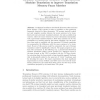Free Online Productivity Tools
i2Speak
i2Symbol
i2OCR
iTex2Img
iWeb2Print
iWeb2Shot
i2Type
iPdf2Split
iPdf2Merge
i2Bopomofo
i2Arabic
i2Style
i2Image
i2PDF
iLatex2Rtf
Sci2ools
CICLING
2008
Springer
2008
Springer
Dynamic Translation Memory: Using Statistical Machine Translation to Improve Translation Memory Fuzzy Matches
Abstract. Professional translators of technical documents often use Translation Memory (TM) systems in order to capitalize on the repetitions frequently observed in these documents. TM systems typically exploit not only complete matches between the source sentence to be translated and some previously translated sentence, but also so-called fuzzy matches, where the source sentence has some substantial commonality with a previously translated sentence. These fuzzy matches can be very worthwhile as a starting point for the human translator, but the translator then needs to manually edit the associated TM-based translation to accommodate the differences with the source sentence to be translated. If part of this process could be automated, the cost of human translation could be significantly reduced. The paper proposes to perform this automation in the following way: a phrase-based Statistical Machine Translation (SMT) system (trained on a bilingual corpus in the same domain as the TM) is c...
| Added | 12 Oct 2010 |
| Updated | 12 Oct 2010 |
| Type | Conference |
| Year | 2008 |
| Where | CICLING |
| Authors | Ergun Biçici, Marc Dymetman |
Comments (0)

